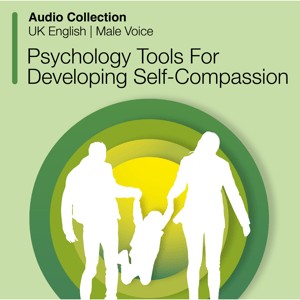Free Compassion Audio Tracks
Psychology Tools For Developing Self-Compassion is a 30-track audio collection which guides clients through an empirically-supported programme of compassionate mind training (CMT). This skills-development program is designed for those who struggle with self-criticism, shame, self-esteem, or any other consequences of living with a tricky brain.

Related resources
Tags
Languages this resource is available in
- English (GB)
Techniques associated with this resource
Introduction & Theoretical Background
The concept of compassion is frequently misunderstood. Amongst practitioners of compassion focused therapy (CFT), compassion is often defined as “a sensitivity to the suffering of self and others, with a commitment to relieve and prevent it”. This definition has two important parts. The first psychology of compassion involves being sensitive to and engaging in distress, whether in ourselves or someone else. The second psychology of compassion involves a commitment to skillfully relieve distress, and to prevent suffering from returning.
What Is Compassion, Why Do I Need It, And How Might It Help Me? is a track taken from the Psychology Tools For Developing Self-Compassion audio collection. In this introductory track, Dr Chris Irons conducts a broad exploration into how and why human beings suffer, what compassion is, and its roots in the human motive of caregiving. He introduces compassion focused therapy, from which this compassionate mind training (CMT) program is
Therapist Guidance
The Psychology Tools For Developing Self-Compassion audio collection is for anyone who wants to learn more about the ideas and practices of compassion focused therapy. It has been designed to be versatile, so it is suitable to support work with therapists who have been trained in compassion focused therapy, or to be used as a stand-alone collection of exercises. To assist the integration of the exercises into their clinical work, therapists can download the scripts for each exercise for use in-session.
Individual tracks from the audio collection can be downloaded as .MP3 files which can be played in most media player apps.
The simplest way to share an audio track with your clients is by using the Psychology Tools ‘Email a client’ function. After obtaining their consent to send them the file you can send it directly from this page by clicking ‘Send securely to my client’. Your client will receive
References And Further Reading
- Gilbert, P. (2014). The origins and nature of compassion focused therapy. British Journal of Clinical Psychology, 53(1), 6-41.
- Gilbert, P. (2020). Compassion: From its evolution to a psychotherapy. Frontiers in Psychology, 3123.
- Irons, C., & Beaumont, E. (2017). The compassionate mind workbook: A step-by-step guide to developing your compassionate self. Robinson.
- Irons, C., & Heriot‐Maitland, C. (2021). Compassionate Mind Training: An 8‐week group for the general public. Psychology and psychotherapy: Theory, research and practice, 94(3), 443-463.
- Leboeuf, I., Andreotti, E., Irons, C., Beaumont, E., & Antoine, P. (2022). A randomized controlled study of a French compassionate mind training. Mindfulness, 13(11), 2891-2903.
- Savari, Y., Mohagheghi, H., & Petrocchi, N. (2021). A preliminary investigation on the effectiveness of compassionate mind training for students with major depressive disorder: A randomized controlled trial. Mindfulness, 12(5), 1159-1172.






